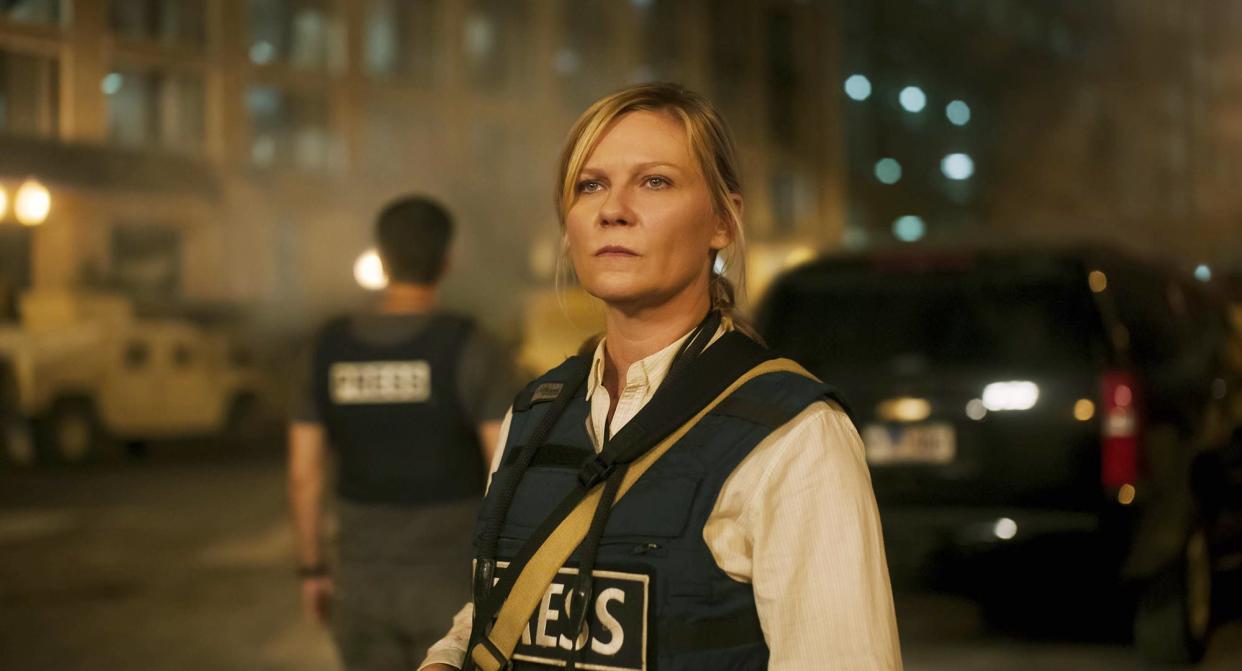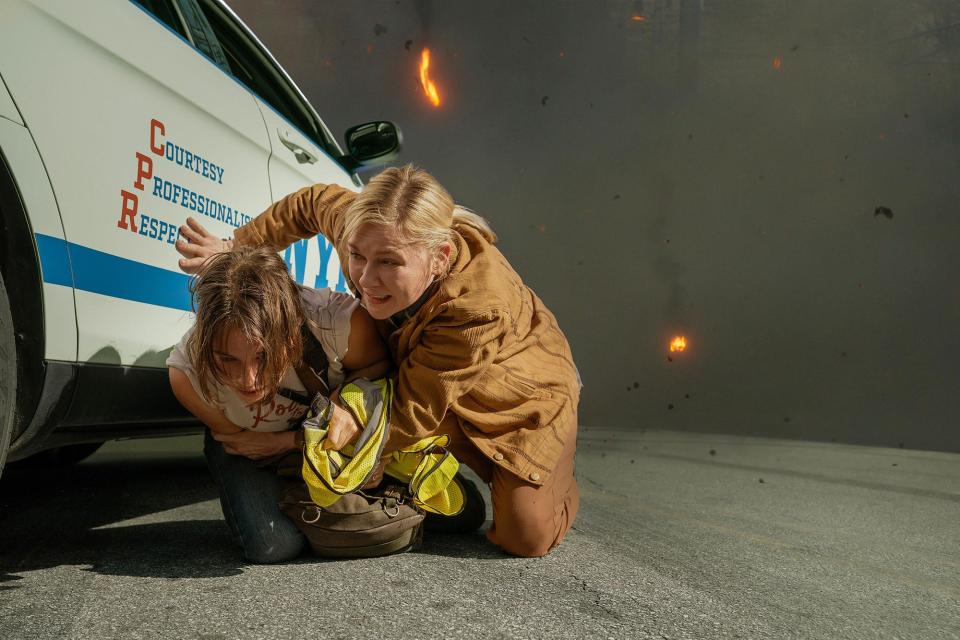Kirsten Dunst’s New Movie ‘Civil War’ Is a ‘Deeply Absorbing Dystopian Vision of the Future’

Civil War earns 3 stars (out of 4) from Us Weekly movie critic Mara Reinstein.
Maybe it’s best to start with a rundown of what Civil War is not.
Despite the title, the ominous poster depicting the Statue of Liberty torch and the trailer in which Kirsten Dunst talks gravely about the need to go to Washington, D.C., this is not a political movie. It has no overt ties to the upcoming election. Writer-director Alex Garland (Men, Ex-Machina) never bothers to explain what the POTUS (Nick Offerman) exactly did to spur on a divided nation in which Texas and California are aligned.
Red states, blue states. Neither classification matters compared to the terrifying state of affairs.
Civil War is also not a movie that begs for repeated viewings. Forget about any twisty or open-to-interpretation ambiguity about all the intense violence. Garland, a London native, presents his grim cautionary tale loud and clear with every piercing gun shot. But that doesn’t mean this deeply absorbing dystopian vision of the future is easy to shake off.
So what are we dealing with here? An exploration of combat journalists languishing in a moral gray area in the name of their jobs. Dunst’s Lee Miller is a veteran and celebrated war photographer who shows scant emotion while bullets are flying at her in New York City. She just wants to tell a story with her camera. Now she and her work partner, a writer named Joel (Wagner Moura), want to go to the White House to interview the reclusive and embattled third-term president. As Joel reasons in a way-too-dubious declaration, “Interviewing him is the only story left.”

Securing the sit-down will require traveling more than 800 miles via a beat-up white press van through active war zones and hostile territories guarded by merciless and heavily armed forces. On a personal level, Lee is also conflicted that a 23-year-old ambitious-but-green photographer (Priscilla star Cailee Spaeny) has wormed her way into the car. Her Jessie character is relegated to the back seat, along with a grizzled New York Times reporter (Stephen Henderson).
The group barrels through Pennsylvania, West Virginia and Virginia, where emotionally hollowed-out locals scrounge for food and water and resources. The suspense level at every stop is almost unbearably high. Each encounter with a stranger carries a whiff of doom: Filling up the tank with gas at a desolate station requires delicate dealmaking with its wary owners; a sunny twentysomething girl working behind the counter at an empty clothing boutique seems untrustworthy.
The optimism of spring is often contrasted with the stench of death. In one harrowing scene that underscores the madness, a sadistic soldier (an uncredited Jesse Plemons, i.e., Dunst’s husband) standing in the greenery murders bystanders with the disarming casualty of swatting away a fly. It’s such a quietly chilling experience that the ensuing chaotic violence at the White House feels numbing and anticlimactic by comparison.
24 Movies We Can’t Wait to See in 2024: From ‘Mean Girls’ to ‘Dune: Part Two’
Civil War can be frustrating in parts. War aside, Garland doesn’t have a clear POV about journalists who get a firsthand look at the horrors around them. Dunst portrays Lee as a jaded and stony professional, while Jessie is the wide-eyed idealist who vomits after a near-death trauma. They’re both heroes in their own way, yet neither quite captures the heart or the empathy when it matters the most.
The logic of their assignment — more like their mission — feels askew as well. Who and where is the audience for these risk-taking journalists? Working cellular service is long gone; nobody uses a phone or has regular access to the internet. The closest thing this movie comes to a laugh is when Moura makes a wry aside about “what’s left of The New York Times.” Dunst and Spaeny take many photos throughout the journey, complete with a distracting camera clickety-click sound effect. But do their images really make a lick of difference in this cynical reality?
There are no correct answers, of course. Because of the film’s narrow narrative scope and its single-focused characters, audiences must just digest the visual consequences of this civil war: Empty highways, residential lawlessness, an abandoned shopping center, cities literally under fire and a final cunning image that sears the soul.
None of the above makes for consumable entertainment — but, at this moment in time, it’s all disturbingly effective.
Civil War, which premiered at the SXSW Festival, opens in theaters Friday, April 12.
